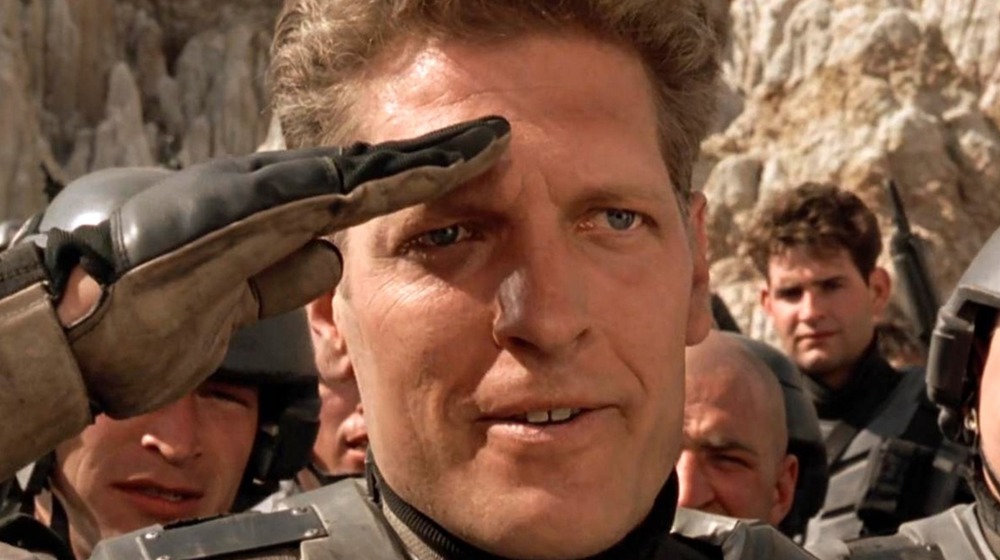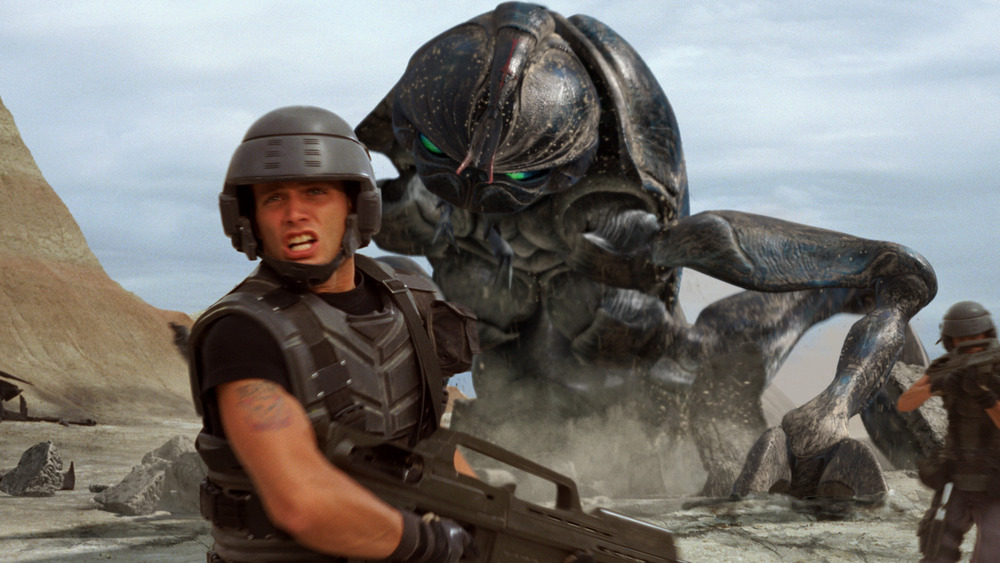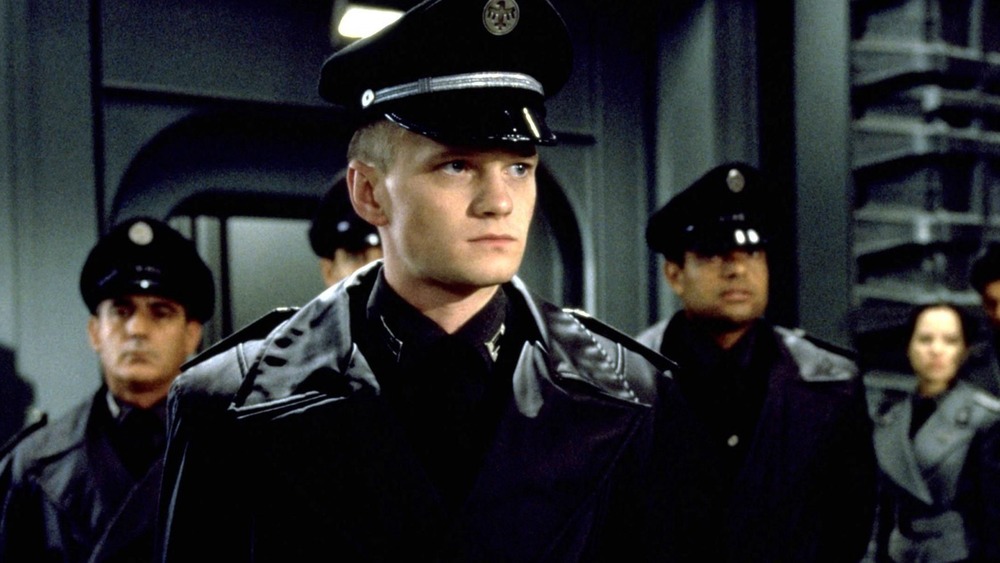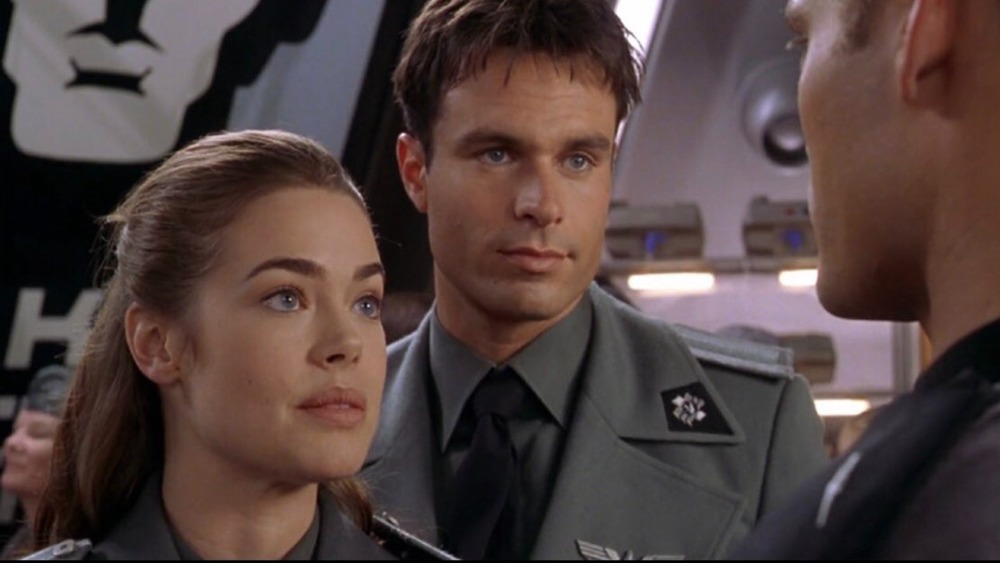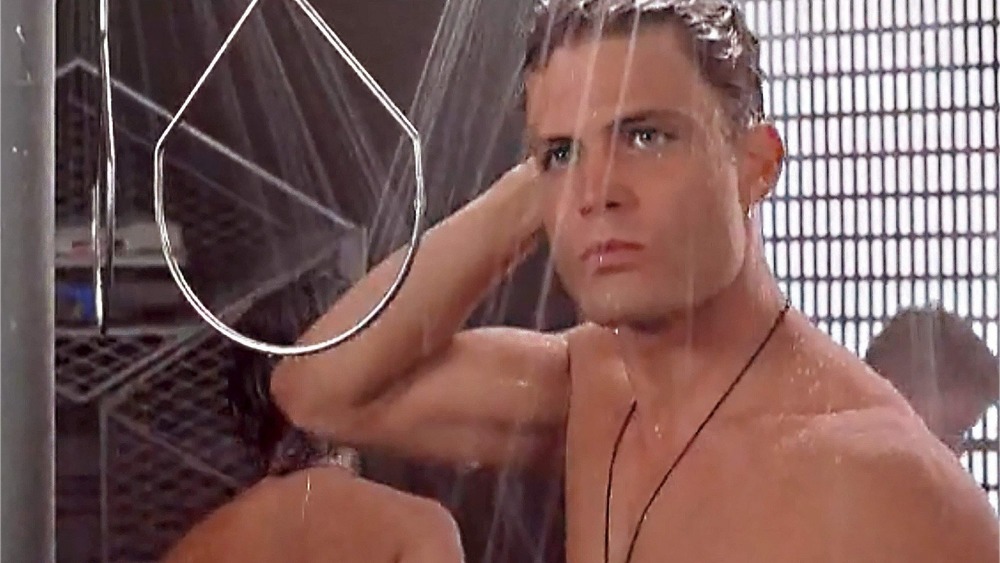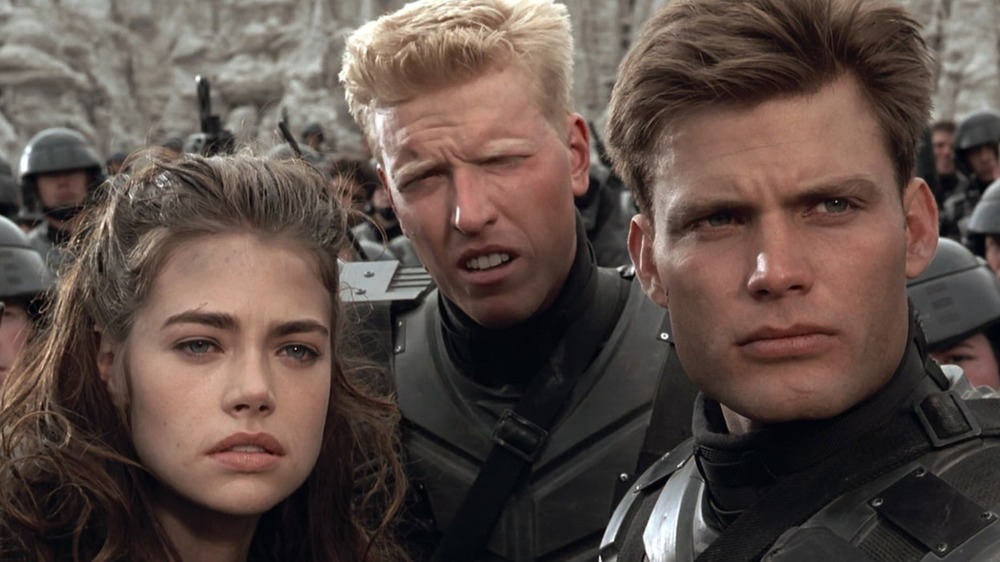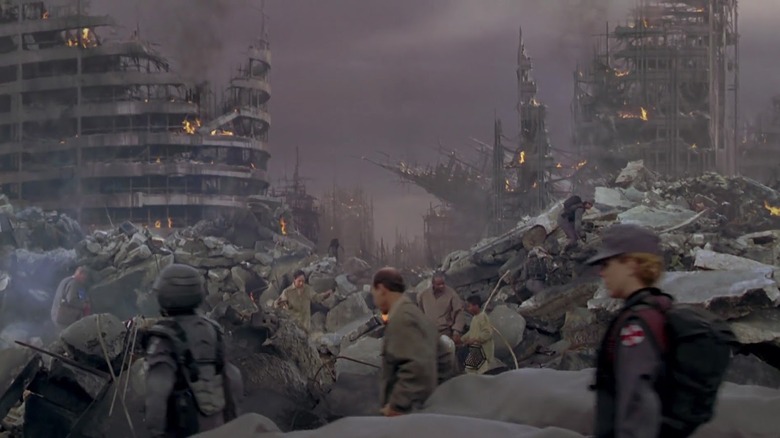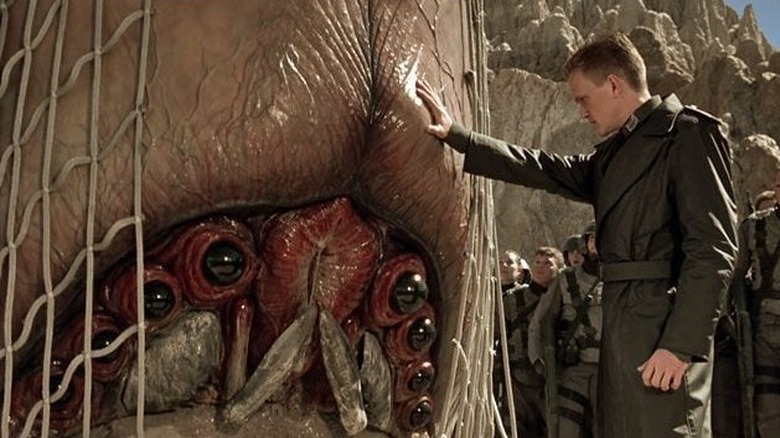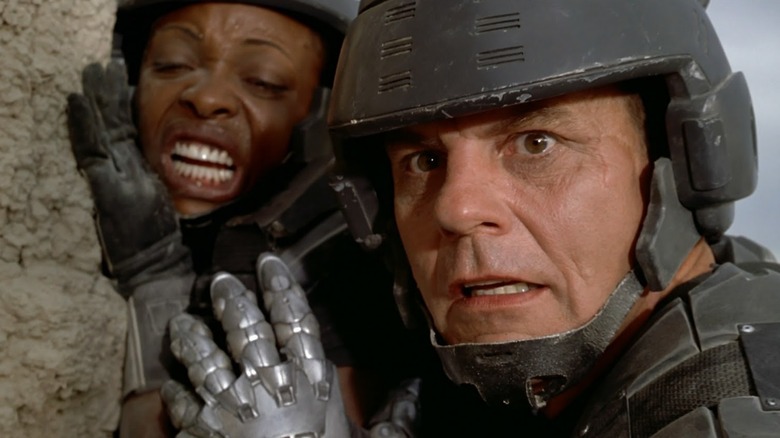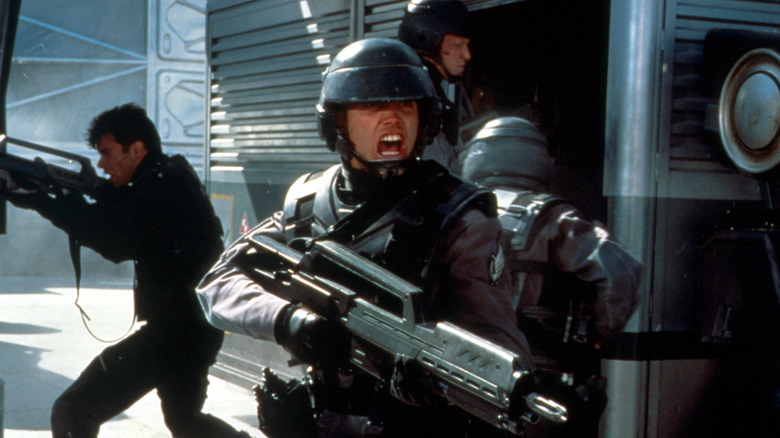Things You Only Notice In Starship Troopers As An Adult
Paul Verhoeven probably never intended for Starship Troopers to be seen by children. Then again, it's the type of movie that youngsters who are searching for action, violence, and giant creatures in their entertainment will gravitate toward. The franchise has also dipped its toes in child-friendly media throughout the years. As Den of Geek pointed out, Starship Troopers is one of the several R-rated movies to receive its own cartoon spinoff, which undoubtedly led to more kids discovering Verhoeven's 1997 blockbuster and appreciating it even more as adults.
Based on Robert A. Heinlein's 1959 novel of the same name, Starship Troopers wasn't an overnight success. According to The Numbers, the film barely recouped its production budget during its theatrical run, while critics dismissed it as a dumb, schlocky action movie. Over time, however, Starship Troopers became a cult classic and is now regarded by many film fans as a misunderstood gem that has more on its mind than senseless splatter. As he demonstrated with RoboCop and Total Recall years before, Verhoeven has a knack for combining thrilling action with camp humor and biting satire. Starship Troopers is in the same wheelhouse as those movies, though it brings its own ideas and critiques to the table.
As the saying goes, "would you like to know more?"
Starship Troopers is a counterargument to Robert A. Heinlein's novel
Most filmmakers take on book adaptations because they enjoy the source material. That wasn't the case for Verhoeven when he agreed to helm Starship Troopers; the director interpreted the novel as ideologically fascist and pro-war. Verhoeven grew up in Nazi-occupied Holland during World War II (per Screen Rant), so it's understandable why he opted to lambast those ideas. In an interview with Digital Spy, the director explained that he wanted to make a movie about a "fascist utopia" in which the citizens aren't aware of what was really going on. In the film, Johnny Rico (Casper Van Dien) and his Mobile Infantry unit are more than happy to risks their lives on the battlefield, despite the fact they're viewed as nothing more than "fresh meat for the grinder" by their higher-ups.
While Starship Troopers is a cautionary tale about the dangers of totalitarianism, the movie boasts a cast of likable characters who are easy to root for. When you overlook their enjoyment of blasting through bugs and how they blindly follow a questionable regime, the heroes are regular people who'd be fun to hang out with at parties. This element further drives home the idea that everyday folks can easily become spokes in the wheel of an authoritarian state if they don't hold their leaders accountable.
There's a lot of Nazi imagery on display in Starship Troopers
If you're going to make a movie that skewers fascist ideology, you have to connect it to fascism somehow. Starship Troopers isn't exactly subtle in this regard. After all, the film is littered with Nazi imagery and nods to German propaganda films from World War II. The opening shot was pinched from Leni Riefenstahl's Triumph of the Will, the troopers goose step as they march, and the officers' uniforms are very reminiscent of the German SS and Gestapo. Basically, it ticks off most of the boxes you'll find on a Nazi 101 checklist.
Of course, the obvious Nazi-themed visuals were included because Verhoeven and co. wanted to get their point across to the audience. However, they also appreciated the aesthetic appeal of the uniforms. While speaking to Entertainment Weekly, Starship Troopers screenwriter Ed Neumeier talked about how "Germans made the best-looking stuff," which appealed to the film's art directors and costume designers. In the same interview, Verhoeven added that the goal was to deconstruct propaganda films and give the viewers some food for thought regarding the bigger issues. "I tried to seduce the audience to join [Troopers'] society, but then ask, 'What are you really joining up for?'"
Denise Richards' character deserves all the praise
Hollywood likes a good romance story, especially if it involves a love triangle that will enhance the drama and cause some conflict between the characters. Starship Troopers could have easily gone down that route as well. However, most of those scenes were cut after test audiences got mad about a subplot in which Denise Richards' character, Carmen, couldn't decide if she wanted to be with Rico or Zander Barcalow (Patrick Muldoon). While a love triangle is teased between the trio — and Rico acts jealous at times — Starship Troopers is more interested in Carmen's personal qualities than her love life. She's depicted as a smart, career-driven pilot who's good at her job and doesn't need to be romantically involved with anyone to be interesting.
According to The Guardian, Richards described Carmen as a "strong woman" and "great role model." She also noted that the lack of romantic resolution for her character was the best decision, as young love is messy and everyone gets their heartbroken at some point. If there is any message regarding love to be found in Starship Troopers (besides fascists loving war), it's that there's no such thing as living happily ever after.
The showers in Starship Troopers are gender neutral
Okay, so clearly we all noticed the room full of naked people, regardless of when we saw the film, but we may not have appreciated the subtext until later in life. There's an argument to be made that the infamous co-ed shower scene in Starship Troopers isn't necessary. That it was designed to incite thirst and nothing more. Let's not forget that Verhoeven directed Basic Instinct and Showgirls years prior, so he wasn't exactly above that sort of thing going in the '90s. However, this particular scene involving naked people isn't as gratuitous as it might appear. In the scene, the main group of recruits discuss their reasons for enlisting in the military. One of them wants to escape the farm life and see the universe. Another has political aspirations and needs to serve in order to accomplish that goal. It's a telling moment that highlights the camaraderie between the troopers, and at no point do any of the characters showcase any desires toward each other; the only potential titillation is on behalf of the audience.
The shower conversation basically enforces the idea that all of the soldiers are regarded as equals, which is a quite a progressive theme for a movie about a fascist military industrial complex. However, Starship Troopers is refreshing in its portrayal of gender politics — in fact, it even passes the Bechdel Test several times over.
Starship Troopers lacks racial diversity (but that's the point)
Starship Troopers has an all-white main cast, and most of them are quite good looking. In many ways, they represent the type of pure Aryan specimens that you'd expect to see in a Third Reich fantasy. It's no secret that the film contains numerous nods to that problematic period in history, and the movie's lack of diversity was certainly intentional on the part of the filmmakers. Paul Verhoeven spoke directly to the idea when talking about casting Casper Van Dien as Johnny Rico in Starship Troopers. "Mark Wahlberg and Matt Damon auditioned, but I was looking for the prototype of blond, white and arrogant, and Casper Van Dien was so close to the images I remembered from Leni Riefenstahl's films," Verhoeven said (via The Guardian).
That said, it's worth noting that there's more diversity in the original novel. Per The Wrap, the book's lead character is a Filipino man named Juan. This aspect was overlooked by Verhoeven and Neumeier for artistic reasons, but it still makes Starship Troopers one of the many Hollywood blockbusters to have whitewashed POC characters from the original source material. At the same time, commenting on fascism wasn't the only reason for casting Van Dien, Richards, Neil Patrick Harris, Jake Busey and other '90s heartthrobs in the main roles. According to Screen Slate, Verhoeven wanted actors who looked wholesome, innocent and classically beautiful, further enhancing the notion that war makes so-called good people do rotten things. Adding more diversity could have illustrated this point just the same, but there's no denying that Starship Troopers is clear about its intentions.
Buenos Aires was probably an inside job
It's no secret that "Starship Troopers" is a subversive movie, which is exactly why director Paul Verhoeven chose to take a straightforward piece of 1950s military science fiction by Robert A. Heinlein and turn it on its head. It was Verhoeven's intention from the very beginning to satirize both the original pro-war novel as well as the increasingly imperialistic nature of the United States. To that end, the movie made some key changes from the book that seek to show how evil the military-run government of "Starship Troopers" really is underneath all the actiony gloss.
One of the biggest examples of this is the Buenos Aires plotline, which can easily be taken at face value until you re-watch it as an adult. In "Starship Troopers," the mysterious enemy race of aliens known as the Arachnids are seemingly capable of hurling asteroids across vast distances of space to attack human targets. So when an asteroid decimates the Earth city of Buenos Aires (which is where Johnny Rico's parents live), it sets humanity on a bloodthirsty war of revenge against the aliens. Yet, the filmmakers hint at more going on with this event than the characters would make it seem. Many astute fans have speculated that the destruction of Buenos Aires was a false flag attack by the human government on itself to justify an invasion of Klendathu (the Arachnid homeworld). Within the world of "Starship Troopers," the only information about the Arachnid's capability to send asteroids toward Earth comes from the fascist military government itself, which casts doubt on the credibility of their claims entirely.
The bugs are the good guys
In "Starship Troopers," humanity's militaristic society does everything it can to paint its alien bug enemies as the most heartless creatures imaginable. Multiple propaganda scenes are featured solely to degrade, devalue, and disrespect their Arachnid foe as part of humanity's war effort, but how true is that really? Fans of the film know that Paul Verhoeven intentionally made the film seem like a piece of fascist propaganda itself, portraying a utopian fascist society that, to audience members in 1997, would look absurdly nightmarish. As a piece of biting satire, "Starship Troopers" is one of the boldest depictions of fascism ever put to film.
Because of its satirical nature and propagandistic tone, it's no surprise that the characters of the film are so merciless to their bug-like enemies. One scene in which children back on Earth are seen squishing real-life cockroaches as a patriotic act for the war to symbolize humanity crushing the Arachnids stands out. This hatred turns out to be unearned, as it becomes clear that the bugs are fighting a defensive war against human aggression across the stars. They are completely misunderstood creatures that are seemingly forced into conflict with humanity as they colonize multiple worlds which don't belong to them. The end of the film shows just how innocent and victimized the bugs really are when, after capturing the massive brain bug, Carl Jenkins (played by Neil Patrick Harris) is able to feel its emotions and relay them to the army of troopers. He tells them, "It's afraid!" and is met with thunderous applause and cheers of victory. That's all you need to know about which side is more ruthless in this war.
Rico's teachers are disfigured from the cycle of war
While the end of the movie features all the explosive action that fans enjoy, the first half of "Starship Troopers" focuses more on how these attractive young humans are being trained for war. Johnny Rico (played by Casper Van Dien) along with his friends Dizzy (Dina Meyer), Carmen (Denise Richards), and Ace (Jake Busey) are all taught by a roster of intimidating instructors who have experienced combat first-hand.
On first viewing, these training scenes are overshadowed by the budding love rectangle between Rico, Dizzy, Carmen, and Rico's arch-rival Zander Barcalow (Patrick Muldoon). It isn't until revisiting the movie as an adult that the depressing nature of this teacher-student dynamic becomes apparent. All of the instructors fought in the war against the Arachnids, and they suffered horrific physical disfigurements from combat. Some examples of this are Jean Rasczak (Michael Ironside), who is missing one of his arms, and the biology teacher (Rue McClanahan) who is blind and scarred. What's particularly interesting about the condition of the teachers is that it foreshadows the fates of the students who go on to grievous injuries or death in the war.
The movie has an unhappy ending
"Starship Troopers" seems to have a happy ending, with our heroes defeating their enemies and going off to successful military careers, but it doesn't take long for this excitement to feel hollow, thanks to the film's satirical edge. The character arc of Johnny Rico, from the beginning of the story to his final moments, shows just how sad of an ending this really is.
At the start of "Starship Troopers," Johnny Rico is a conflicted character who is unsure of his place in the military machinery. He joins the mobile infantry for his girlfriend, not because of any sense of patriotic duty. While it's true that in this world "service guarantees citizenship," his desire to continue a romantic relationship with Carmen (who herself is a space pilot) is what draws him into the war. He shows more compassion and conscientiousness during his training and deep regret after accidentally killing a fellow soldier during an exercise gone wrong. It's not until the invasion of Klendathu after his parents are killed in the Buenos Aires attack that Rico drastically changes into a soulless killing machine. "Starship Troopers" ends with an in-universe propaganda video beckoning new recruits to join the military so they can be heroes like Rico, who is seen happily leading troops into battle with a bloodthirsty rage. For a man as initially open-minded as Rico, this is truly an unhappy ending, as he's completely become a cog in the war machine.
